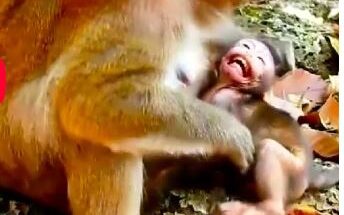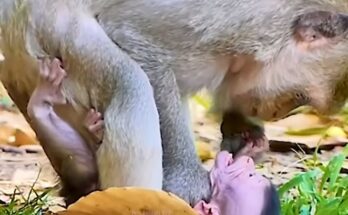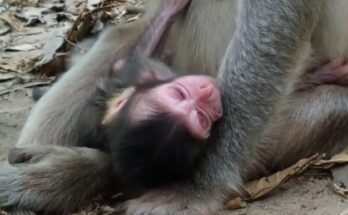In the dense forests where monkeys swing freely from tree to tree, the bond between a mother and her baby is typically one of the strongest in the animal kingdom. However, not every infant is fortunate enough to receive the nurturing care they need. In some heartbreaking cases, a mother monkey may refuse to nurse her baby, leaving the little one to struggle for survival. Yet, despite such rejection, some baby monkeys display remarkable resilience, refusing to give up on the love and sustenance they so desperately need.
A Heartbreaking Rejection
For most primates, maternal care is essential for an infant’s survival. Newborn monkeys are dependent on their mothers for food, warmth, and protection. Nursing is not just about nutrition; it also fosters a deep emotional bond between the mother and her child. However, when a mother rejects her baby, it creates a tragic and challenging situation.
There are several reasons why a mother monkey might refuse to nurse her offspring. Sometimes, a first-time mother may not instinctively know how to care for her baby. Other times, the mother may be too weak, malnourished, or stressed to produce enough milk. In some cases, the infant may have health issues that the mother instinctively detects, leading her to abandon it in favor of preserving her own energy for future offspring.
Regardless of the cause, the sight of a rejected baby monkey is heartbreaking. The tiny creature clings desperately to its mother, crying out for comfort and nourishment, only to be pushed away repeatedly. Yet, nature often produces stories of incredible determination, and some little ones refuse to give up without a fight.
The Baby’s Struggle for Survival
Despite being rejected, a baby monkey’s survival instinct kicks in. Some rejected infants persistently cling to their mothers, hoping that continued contact will eventually trigger maternal instincts. In some cases, their persistence works, and the mother eventually relents, allowing the baby to nurse. However, in many instances, the mother remains indifferent, forcing the baby to look elsewhere for sustenance.
In the wild, orphaned or rejected baby monkeys often rely on other members of the troop. In highly social species, other female monkeys, known as “aunties,” may step in to provide care, holding, grooming, or even allowing the infant to nurse if they are lactating. This form of alloparenting can increase the baby’s chances of survival. In some cases, an older sibling or another adult may act as a surrogate parent, offering the rejected infant the warmth and comfort it needs.
Hope in Rescue and Rehabilitation Centers
For rejected baby monkeys in captivity or areas with human intervention, rescue centers often step in to provide the care the infant needs. Hand-rearing baby monkeys is a delicate process, requiring round-the-clock feeding and constant physical affection to compensate for the lack of maternal care. Caretakers act as surrogate mothers, ensuring that the baby receives proper nutrition, warmth, and socialization until it is old enough to integrate with other monkeys.
Though the initial rejection is heartbreaking, the resilience of these little ones reminds us of the power of survival instincts. Whether through persistence, the kindness of others, or human intervention, some of these baby monkeys manage to overcome their difficult beginnings, proving that even in the face of rejection, hope remains.


